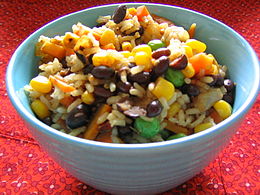 People are correctly raising the issue of whether the positive results (less diabetic nerve pain in type 2 diabetics) are due to the weight loss or to the vegan diet (which caused the quick weight loss)? I suspect it's the average 15 pound weight loss, which lowers inflammation and improves blood flow to the feet. And substituting whole plant-based foods (fruits, vegetables, whole grains, etc) for unhealthy highly processed foods has many health benefits, including controlling blood sugar. They all took B12 supplements because: B12 is found naturally only in animal products, so it's lacking in vegan diets; the diabetic medicine metformin lowers B12 levels; and a deficiency in vitamin B12 can actually cause nerve damage. Bottom line which applies to both diabetics and non-diabetics: some weight loss is good (if overweight), as is increasing beans, nuts, whole grains, vegetables, fruit and plant-based oils in the diet. From Medical Xpress:
People are correctly raising the issue of whether the positive results (less diabetic nerve pain in type 2 diabetics) are due to the weight loss or to the vegan diet (which caused the quick weight loss)? I suspect it's the average 15 pound weight loss, which lowers inflammation and improves blood flow to the feet. And substituting whole plant-based foods (fruits, vegetables, whole grains, etc) for unhealthy highly processed foods has many health benefits, including controlling blood sugar. They all took B12 supplements because: B12 is found naturally only in animal products, so it's lacking in vegan diets; the diabetic medicine metformin lowers B12 levels; and a deficiency in vitamin B12 can actually cause nerve damage. Bottom line which applies to both diabetics and non-diabetics: some weight loss is good (if overweight), as is increasing beans, nuts, whole grains, vegetables, fruit and plant-based oils in the diet. From Medical Xpress:
Vegan diet might ease diabetic nerve pain
A vegan diet might help people with diabetes-related nerve damage shed weight and find some pain relief, a small pilot study suggests. Vegan diets are free of all animal products, including eggs and dairy. Instead, people get their protein, fat and all other nutrients from foods such as beans, nuts, whole grains, vegetables, fruit and plant-based oils.
In the new study, researchers tested whether a vegan diet could help people with type 2 diabetes and painful nerve damage in their feet or hands. The investigators found that over 20 weeks, the 17 people they assigned to the diet lost an average of 15 pounds. At the same time, blood flow to their feet improved and their pain eased up.
But it's not clear that you have to go vegan to do that. "It's hard to say that it's this particular diet, itself," said Dr. Maria Pena, an endocrinologist and weight-management specialist at Lenox Hill Hospital in New York City..... Losing extra fat can decrease inflammation in the body, and improve a person's mobility—both of which could help ease diabetic nerve pain, she explained. Plus, Pena said, better blood sugar control is key to reducing diabetic nerve pain—and the vegan dieters in this study did rein their sugar levels in. That shows the all-plant diet had benefits, according to Pena. But, she said, any diet that encourages weight loss and replaces processed foods with healthy "whole" foods might do the same.
About half of all people with diabetes eventually develop nerve damage because of chronically high blood sugar levels, according to the U.S. National Institutes of Health.The nerve damage—known as neuropathy—can occur anywhere, but most often affects the feet and legs. It can trigger sharp pain, burning sensations, tingling or sensitivity to even a light touch; it also makes people susceptible to serious foot problems, including ulcers and infections.
For the study, Wells and her colleagues recruited 34 adults with type 2 diabetes and painful neuropathy. They randomly assigned half to follow a vegan diet and take a vitamin B12 supplement; the rest took the supplement but stuck with their normal diets. The dieters were told to limit themselves to 20 to 30 grams of fat per day, and to load up on "low GI" foods, which are foods that do not cause a large surge in blood sugar.Breakfast might include oatmeal with raisins, Wells said, while dinner could be lentil stew, or a vegetable stir-fry with rice. After about five months, the vegan group had lost 15 pounds, on average, versus about 1 pound in the comparison group. They also reported bigger improvements on a standard pain-rating survey.

 A big question for many adults is: how can one age well and live to a ripe old age? The author of the book
A big question for many adults is: how can one age well and live to a ripe old age? The author of the book  My last post
My last post  Nice summary of cancer prevention advice. What it boils down to is that there is no magic bullet for cancer prevention (maybe the closest thing is to NOT smoke), but it's a lot of little things adding up (your lifestyle) that lowers the risk of cancer. From The Washington Post:
Nice summary of cancer prevention advice. What it boils down to is that there is no magic bullet for cancer prevention (maybe the closest thing is to NOT smoke), but it's a lot of little things adding up (your lifestyle) that lowers the risk of cancer. From The Washington Post: